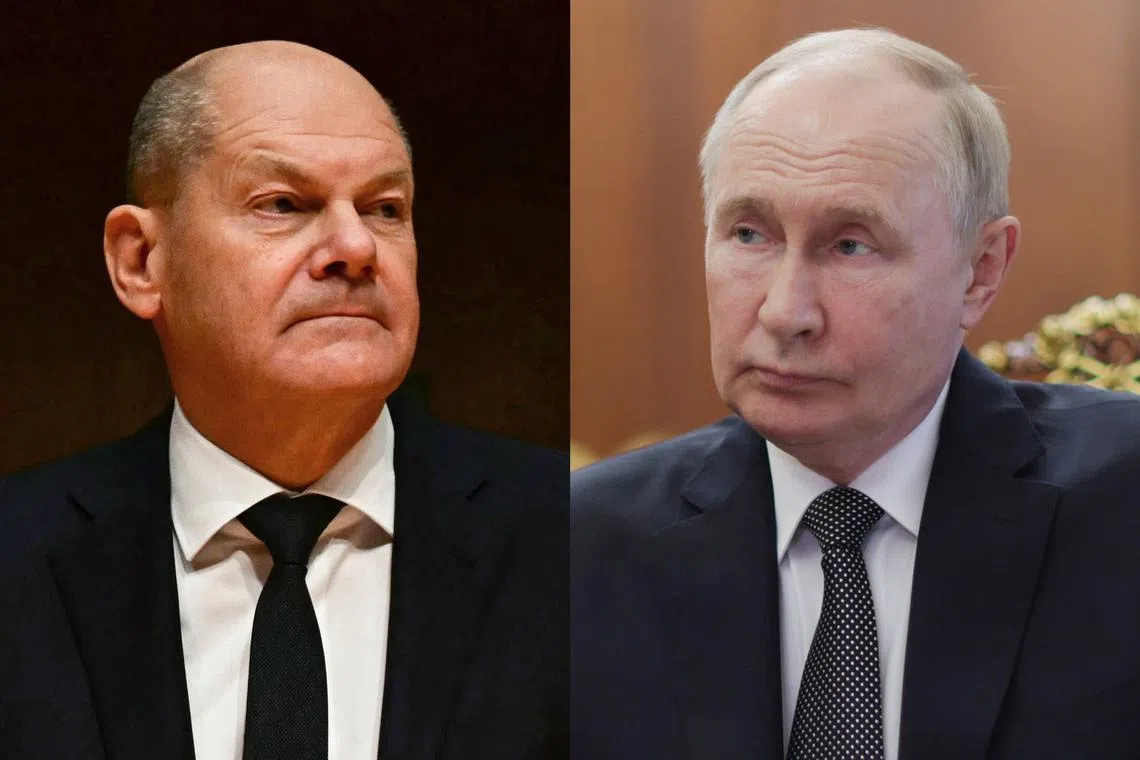Germany’s Scholz urges Putin in phone call to open talks with Ukraine
Sign up now: Get ST's newsletters delivered to your inbox

German Chancellor Olaf Scholz demanded in a one-hour call with Russian President Vladimir Putin that he withdraw his troops from Ukraine.
PHOTOS: AFP, EPA-EFE
BERLIN – German Chancellor Olaf Scholz urged Russian President Vladimir Putin on Nov 15, in their first phone call in nearly two years, to pull his forces out of Ukraine and begin talks with Kyiv that would open the way for a “just and lasting peace”.
The Kremlin confirmed the conversation, which it said had come at Berlin’s request, and said Mr Putin had told Mr Scholz any agreement to end the war in Ukraine must take Russian security interests into account and reflect “new territorial realities”.
“The Chancellor urged Russia to show willingness to enter talks with Ukraine with the aim of achieving a just and lasting peace,” a German government spokesperson said in a statement.
“He stressed Germany’s unbroken determination to back Ukraine in its defence against Russian aggression for as long as necessary,” the spokesperson added.
Ukrainian President Volodymyr Zelensky cautioned Mr Scholz against holding the call
“The President (Mr Zelensky) said this would only help Putin by reducing his isolation. Putin doesn’t want real peace, he wants a break,” the Ukrainian source told Reuters.
It was not immediately clear why Mr Scholz chose to speak now to Mr Putin, but the call comes amid setbacks for Ukraine on the battlefield and increased concerns among Kyiv’s Western allies about US President-elect Donald Trump’s plans with regard to Ukraine.
Trump has repeatedly criticised the scale of Western financial and military aid for Kyiv.
Adding to the mood of uncertainty, Germany will hold a snap election on Feb 23 in which Mr Scholz’s Social Democrats face a stiff challenge from left-wing and far-right parties that oppose Berlin’s strong backing for Ukraine.
“Scholz believes his communication with Putin would strengthen his hand internally, before the election,” wrote Mr Daniel Szeligowski, of the Polish Institute for International Affairs, on social media.
Tough challenges
The Kremlin said Mr Putin had told Mr Scholz Russia was willing to look at energy deals if Germany was interested. Germany was heavily reliant on Russian gas before the war but direct shipments ceased when pipelines under the Baltic Sea were blown up in 2022.
Mr Scholz plans to brief Mr Zelensky, Germany’s allies, partners and the heads of the European Union and Nato on the outcome of the Nov 15 call, officials said.
Mr Putin and Mr Scholz agreed to stay in contact, they added.
Ukraine is facing increasingly difficult conditions on the front lines in its east, amid shortages of arms and personnel, while Russian forces make steady advances.
A separate German government official said Mr Scholz had told Mr Putin the deployment of North Korean troops to Russia
Mr Zelensky says North Korea has 11,000 troops in Russia and that some have suffered casualties in combat with Ukrainian forces which are currently occupying territory in Russia’s southern Kursk region.
Germany has given Ukraine a total of €15 billion (S$20 billion) in financial, humanitarian and military support since the start of the full-scale war, making it Kyiv’s second-largest backer after the United States.
The future of US aid to Ukraine is unclear following Trump’s election victory.
Mr Scholz and Mr Putin last spoke in December 2022, 10 months after Russia launched its full-scale invasion of Ukraine, plunging relations with the West into their deepest freeze since the Cold War. REUTERS


